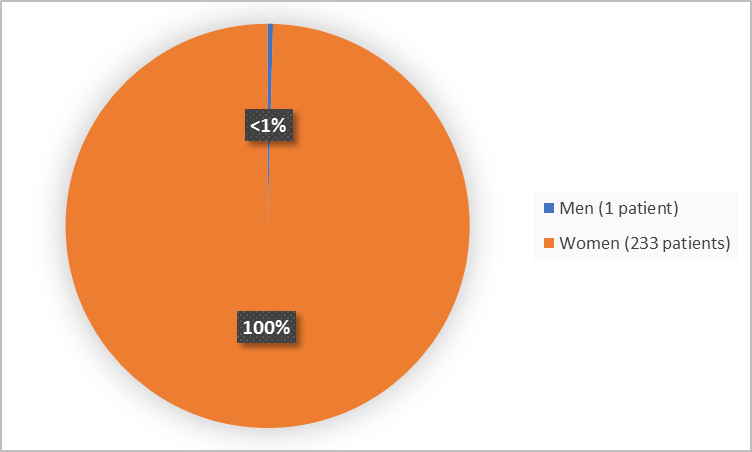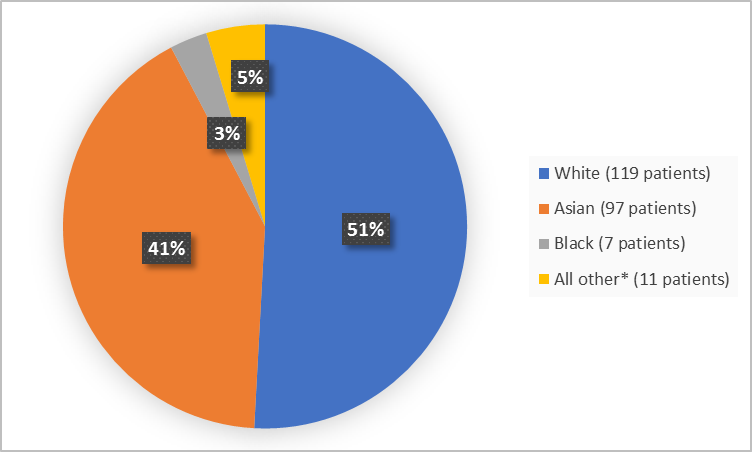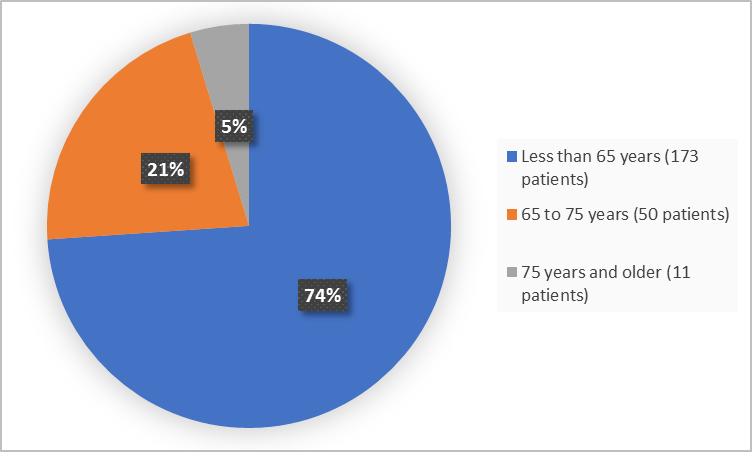A new DRUG TRIALS SNAPSHOT is now available.

ENHERTU is a drug for treatment of adults with human epidermal growth factor receptor 2 (HER2)-positive breast cancer that has spread to other parts of the body (metastatic) or cannot not be removed by surgery. It should be used in patients who have been previously treated for their metastatic disease with at least two anti-HER2 regimens.
ENHERTU is an injection. It is given by a healthcare provided directly into the vein (an intravenous infusion) once every three weeks. It takes about 90 minutes to receive the first infusion. If well tolerated, subsequent infusions take 30 minutes.
See more Drug Trials Snapshots or contact us with questions at Snapshots@fda.hhs.gov.
Drug Trials Snapshot: ENHERTU
ENHERTU (fam-trastuzumab deruxtecan-nxki)
(en HER too)
Daiichi Sankyo, Inc.
Approval date: December 20, 2019
(en HER too)
Daiichi Sankyo, Inc.
Approval date: December 20, 2019
DRUG TRIALS SNAPSHOT SUMMARY:
What is the drug for?
ENHERTU is a drug for treatment of adults with human epidermal growth factor receptor 2 (HER2)-positive breast cancer that has spread to other parts of the body (metastatic) or cannot not be removed by surgery. It should be used in patients who have been previously treated for their metastatic disease with at least two anti-HER2 regimens.
How is this drug used?
ENHERTU is an injection. It is given by a healthcare provided directly into the vein (an intravenous infusion) once every three weeks. It takes about 90 minutes to receive the first infusion. If well tolerated, subsequent infusions take 30 minutes.
What are the benefits of this drug?
Sixty percent of 184 patients treated with ENHERTU had partial or complete shrinkage of their cancer that lasted an average of 15 months.
ENHERTU was approved under FDA’s accelerated approval program, which provides earlier patient access to a promising new drug while the company continues to conduct clinical trials to confirm that the drug works well.
Were there any differences in how well the drug worked in clinical trials among sex, race and age?
- Sex: Almost all included patients were women, therefore sex differences cannot be determined.
- Race: ENHERTU worked similarly in White and Asian patients.
- Age: ENHERTU worked similarly in patients above and below 65 years of age.
What are the possible side effects?
ENHERTU may cause serious side effects including life threatening lung inflammation (interstitial lung disease and pneumonitis), low white blood cells (neutropenia), weakening of the heart and harm to unborn baby.
The most common side effects of ENHERTU are nausea, fatigue, vomiting, hair loss, constipation, decreased appetite, low blood cell counts, diarrhea, and cough.
Were there any differences in side effects among sex, race and age?
- Sex: Almost all included patients were women therefore sex differences cannot be determined.
- Race: Occurrence of side effects was similar in White and Asian patients.
- Age: The occurrence of overall side effects was similar in patients above and below 65 years of age. There was a higher incidence of more severe (Grade 3-4) side effects observed in patients aged 65 years or older as compared to younger patients.
WHO WAS IN THE CLINICAL TRIALS?
Who participated in the clinical trials?
The FDA approved ENHERTU based on evidence from two clinical trials (Trial 1 NCT03248492/ and Trial 2/NCT02564900) of 234 patients with HER2-positive metastatic breast cancer. The trials were conducted at 86 sites in Europe, United States, Japan and South Korea.
Figure 1 summarizes by sex how many patients were in the clinical trials 1 and 2 combined.
Figure 1. Baseline Demographics by Sex
FDA Review
Figure 2 summarizes patients by race in the clinical trials.
Figure 2. Baseline Demographics by Race
*includes American Indian or Alaska Native, Native Hawaiian or other Pacific Islander, Other, and missing
FDA Review
Figure 3 summarizes patients by age in the clinical trials.
Figure 3. Baseline Demographics by Age
FDA Review
How were the trials designed?
There were two trials that provided data for ENHERTU approval. Both trials enrolled patients with HER2-positive, metastatic breast cancer who have been treated presviously for their metastatic disease.
In Trial 1 patients received ENHERTU by intravenous infusion every three weeks and tumor imagining was obtained every six weeks. The treatment continued until the disease progressed or the side effects became too toxic.
The trial measured the percentage of patients with partial or complete cancer shrinkage and how long that shrinkage lasted. It also provided the data about the side effects.
Trial 2 collected the data on ENHERTU side effects from patients who received the same dosing regimen as the ones from Trial 1.
GLOSSARY
CLINICAL TRIAL: Voluntary research studies conducted in people and designed to answer specific questions about the safety or effectiveness of drugs, vaccines, other therapies, or new ways of using existing treatments.
COMPARATOR: A previously available treatment or placebo used in clinical trials that is compared to the actual drug being tested.
EFFICACY: How well the drug achieves the desired response when it is taken as described in a controlled clinical setting, such as during a clinical trial.
PLACEBO: An inactive substance or “sugar pill” that looks the same as, and is given the same way as, an active drug or treatment being tested. The effects of the active drug or treatment are compared to the effects of the placebo.
SUBGROUP: A subset of the population studied in a clinical trial. Demographic subsets include sex, race, and age groups.
COMPARATOR: A previously available treatment or placebo used in clinical trials that is compared to the actual drug being tested.
EFFICACY: How well the drug achieves the desired response when it is taken as described in a controlled clinical setting, such as during a clinical trial.
PLACEBO: An inactive substance or “sugar pill” that looks the same as, and is given the same way as, an active drug or treatment being tested. The effects of the active drug or treatment are compared to the effects of the placebo.
SUBGROUP: A subset of the population studied in a clinical trial. Demographic subsets include sex, race, and age groups.





































No hay comentarios:
Publicar un comentario